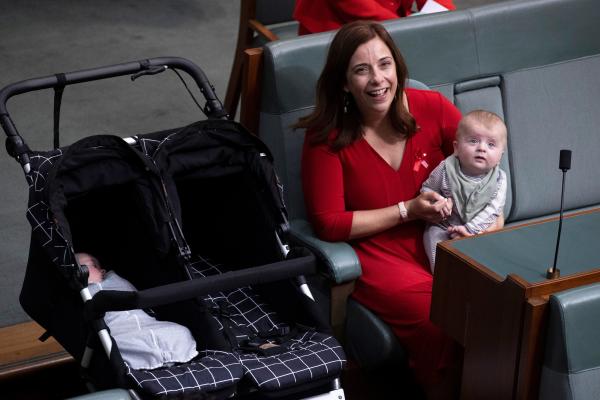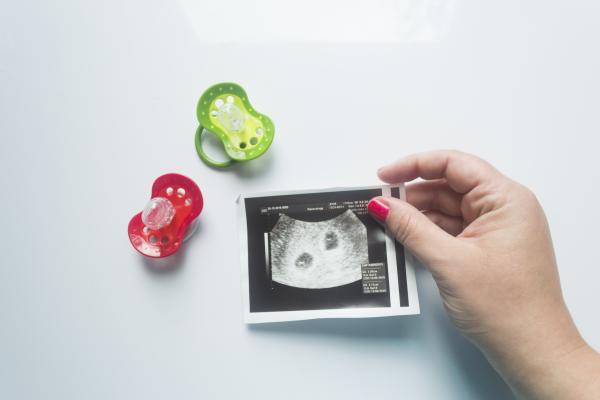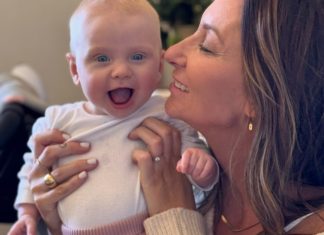By Danielle Galvin
When Brisbane-based Labor MP Anika Wells spoke out in Federal Parliament to share a message in support of Multiple Birth Awareness Week, she had two special little guests with her.
The Member for Lilley held Ossian and Dashiell, her twin boys, to address the House and raise awareness about testing for zygosity and identical or fraternal multiples.
“I never expected to be standing in front of the House with twins, and that is the experience of many twin parents out there,” she said in March.
“I just ran into a twin mum, coming into this place, who said, ’Is it the case that Centrelink and Medicare still do not consider twins to be a multiple birth?’
“I said: ’Yes, that is the case.’ Centrelink and Medicare do not consider twins to be multiple births as it currently stands.
“She said, ’You get in there and tell that parliament that, when you are giving birth to twins, it definitely feels like two babies are coming out,’ and I promised to do that. So, twin parents: I see you, I hear you, and I’m here for you.”
The twins have an older sister, Celeste, to Ms Wells and her husband Finn.
Ms Wells explained why it’s so important to know about whether twins are identical or not.
“You’d be surprised how many parents out there don’t know for sure and they probably don’t think it matters.
“It’s important for health reasons. Identical twins are more likely than fraternal twins to get the same illness. If one twin is diagnosed with a particular condition, the other can be checked for early symptoms.
“Identical twins are also always compatible for organ transplantation or bone marrow donation, if they ever need it.
“It’s important too for twins to know their own identity, and for parents to estimate the likelihood of giving birth to further sets of twins – only fraternal twins are an inherited trait.”
When Ms Wells gave birth to the twins on 20 October last year, Opposition Leader Anthony Albanese announced their safe arrival in parliament, noting how special it was that a sitting member of federal parliament had welcomed twins.
She says no two days are the same as a busy MP and mum of three.
“As fellow parents of small children can testify, there is no real “regular day”.
“Same with my work, which is incredibly dynamic and varied.
“The wheels can, and do fall off regularly. The baby might throw up on you as you’re dressed for work and ready to run out the door, you run out of nappies in the middle of the function you’ve brought the twins along to, you get to daycare only to discover you’ve left the twin backpacks at home.
“But we all just get on with it, we have to.
“Having a supportive partner who shares the load makes what I do as a Federal MP possible. Hats off to those parents who do it on their own.”
Many Australians might not know that some government agencies don’t recognise twins as multiple births.
It’s an issue Ms Wells has been championing.
“When the Australian Multiple Birth Association (AMBA) first lobbied the Federal Government for the Multiple Birth Allowance in the 1990s, they were only able to secure the allowance for triplets or more.
“This still excludes the majority of families with multiples – those with twins.
“Financially it can be a challenge, because unlike with singletons, parents of multiples can’t “stagger” expenses like childcare, education, sports fees. And often the increased costs start during pregnancy, with multiples often leading to higher medical costs, mothers having to finish work earlier etc.
“There’s an AMBA research project underway to quantify these insights. Once that data’s in hand, lobbying for the review of financial support for families of multiples will begin in earnest.”
In the months since Dash and Oshy were born, it’s been full of unique challenges, but also unique experiences that only parents of multiple children experience, Ms Wells said.
She described it as a great privilege.
“It’s particularly special to witness their relationship with each other – how they reach out to hold each other’s hand when they are teething.
“Their bond is beautiful to see.”
She hopes she can be a voice for parents of multiples.
“A voice for multiple parents is important because they face some particular difficulties too.
“Because of the increased cost of care, parents of multiples are less likely to participate in the workforce.
“Another key difference is the increased likelihood of higher medical costs, with the health risks of multiples and their mother increasing by tenfold and the risk of post-partum depression is doubled. “That’s why it’s so important we review our childcare system in Australia, which is the most expensive in the OECD, not only for parents of multiples with for all Australian parents who are trying to manage the juggle of work and family.”









